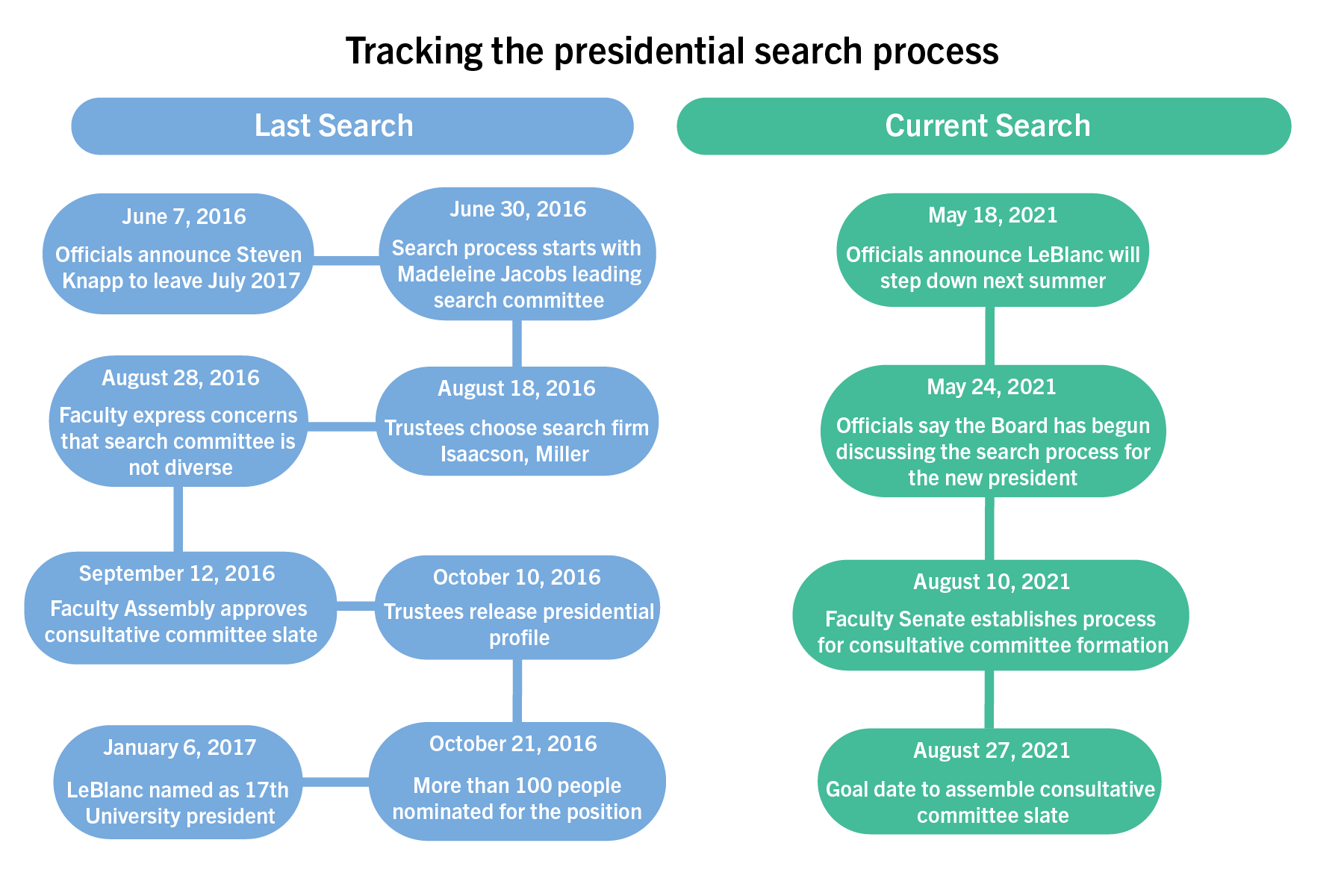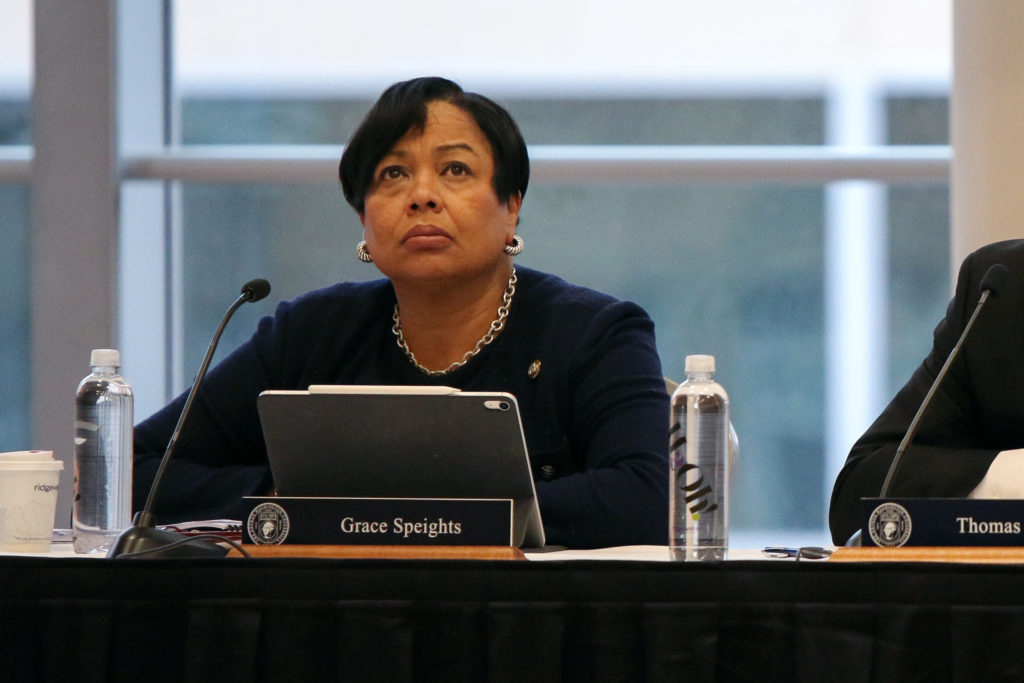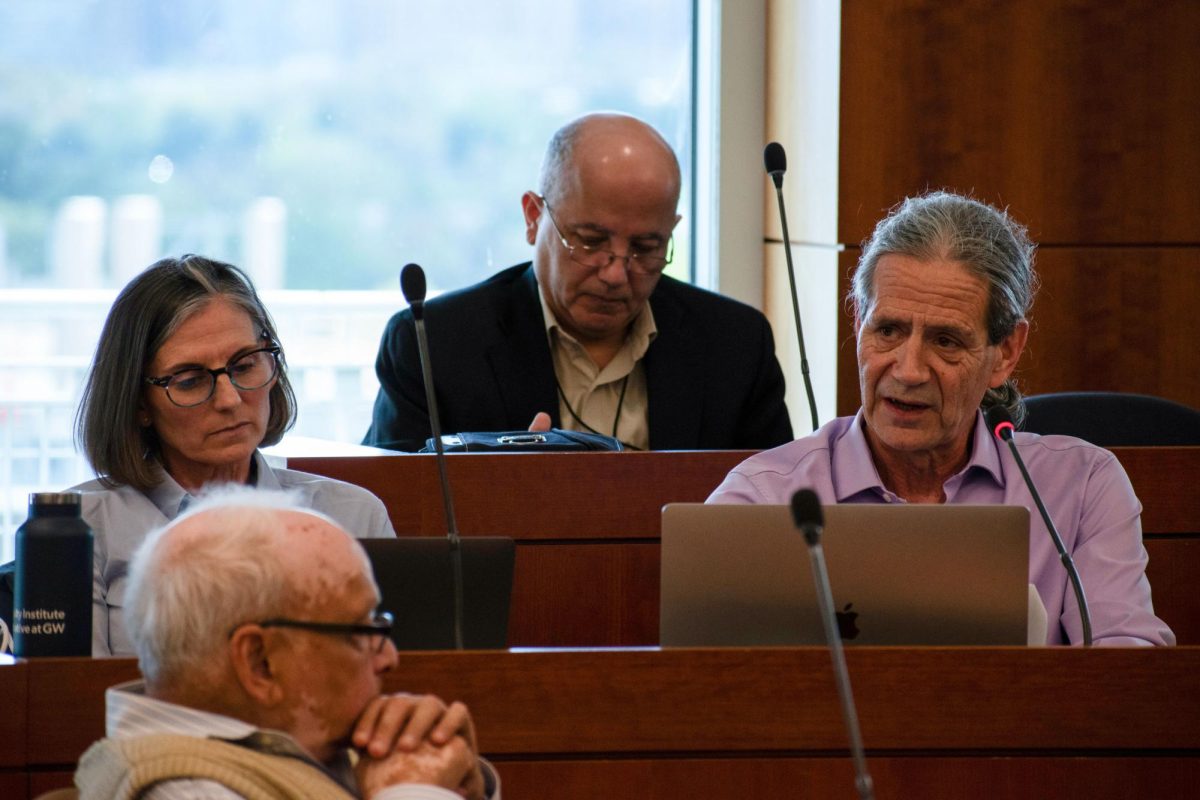Updated: Aug. 23, 2021 at 10:30 a.m.
As University President Thomas LeBlanc closes out his tumultuous tenure this academic year, officials plan to spend the coming months engaging in an extensive search process to identify the next University president.
The presidential search process will be managed by the Board of Trustees, spearheaded by a search committee potentially made up of trustees, faculty, students and alumni and a search firm to assist with the process and help narrow down candidates based on feedback from the committee and the GW community. Officials have declined to share any updates on trustees’ progress with the search and what timeline they expect to follow since a University spokesperson last told The Hatchet in May that trustees have begun discussing the search process.
“At this time there are no updates to share about the presidential search process,” University spokesperson Crystal Nosal said in an email Sunday. “The University will share information with the GW community about the presidential search process in detail when that changes.”
LeBlanc announced in May that he would step down at the end of the upcoming school year as tensions between him and the GW community reached an all-time high. Professors said they hoped GW’s next president would have a more collaborative and transparent approach to leading the University.
Former University President Steven Knapp, LeBlanc’s predecessor, announced his departure on a similar timeline, publicizing in June 2016 that he would depart the following July.
Here’s a look back at the most recent search and what to potentially expect from this year’s process:
Assembling a presidential search committee
By the end of June 2016, the same month Knapp announced he would be stepping down, officials launched the search committee with trustee Madeline Jacobs as chair, which consisted of 10 trustees, six faculty members, the president of the Alumni Association, a staff member and the Student Association president.
By August of 2016 trustees had chosen national executive search firm Isaacson, Miller to help conduct the process. Officials said in 2016 that the firm would identify a “qualified and diverse pool of candidates” and would advise the search committee.
With the news of LeBlanc’s departure now more than three months old, officials have yet to provide any updates on developing a search committee and selecting a search firm.

Nicholas Anastacio | Graphics Editor
Expanding faculty representation
By the end of August 2016, faculty began to express concerns that the search committee lacked diversity in areas like race, gender and discipline.
Of the six professors on the committee, all were from science, math, law or medical fields, all were white and all but one were men. Faculty said at the time that the professors on the committee weren’t representative of the faculty at large.
Andrew Zimmerman – the then-president of the Faculty Association, an independent group of full-time faculty – said at the time that the group sent a letter to the Board earlier in the summer expressing their concerns. He said only then-Board Chair Nelson Carbonell responded to the letter, doubling down on his decision regarding the makeup of the committee.
“I see the makeup of the presidential search committee as just one more sign that the Board of Trustees, as well as Rice Hall, is out of touch with a large portion of the GW faculty,” Zimmerman said in 2016.
In September 2016, the Faculty Assembly approved a group of professors known as the faculty consultative committee to consult on the presidential search.
The consultative committee consisted of 16 members in total – nine who were nominated by each of the University’s schools with senate representation and seven additional members to increase faculty diversity. The consultative committee did not have prior knowledge of who the candidates were, and they were not involved in the interview process in 2016.
The senate approved a similar resolution this month that expanded the faculty consultative committee to include eight professors in addition to the nine who will already be nominated by each school with senate representation.
Senators said at the meeting that they hope to agree upon a slate of members for the committee by Aug. 27, when the senate’s executive committee is set to meet next. They said officials will select faculty members for the presidential search committee from the consultative committee.
Presidential profile
By October of 2016, trustees released their presidential profile – the list of qualities and priorities they’re looking for in a presidential candidate – and officials began to solicit candidates in the following months.
Trustees developed the profile based on two dozen town hall meetings with students, faculty and staff. The profile stated that the ideal candidate would need a “distinct vision” for the University’s future in terms of fundraising and diversity and inclusion.
Selecting the candidate
In late October, officials said more than 100 people had been nominated for the position.
Officials announced in January of 2017 that LeBlanc would be the next University president, and he began his tenure in August of that year. The entire search process – from the time officials announced Knapp would step down to when they selected LeBlanc – took seven months.
But officials are not on track to follow a similar timeline with this year’s search, since they have yet to announce search committee membership for this year’s process more than three months after LeBlanc said he’d retire. They did so in just more than 20 days after Knapp announced he was leaving in 2016.
This story has been updated to reflect the following:
This post has been updated to include a statement from University spokesperson Crystal Nosal.








